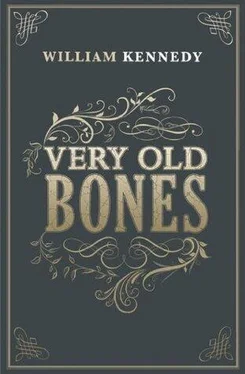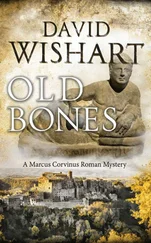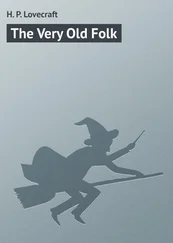“Where’d she have it hid?” Billy asked.
“Inside an old mattress in the cellar.”
“How much?”
“Twelve thousand dollars,” Molly said, and we all wheezed our awe.
“She let you take twelve thousand home?” Billy asked.
“She did. I had to make six trips in the car with my suitcase. Maybe seven.”
“Wasn’t she afraid of goin’ broke?” Billy asked.
“She wasn’t broke.”
“How’d you know that?”
“When she died,” Molly said, “I found another fifteen thousand in two overstuffed chairs and a sofa. That took twelve trips.”
We all wheezed anew.
“Twenty-seven grand,” Billy said.
“Very good arithmetic, Billy,” Molly said.
“What’d you do with it?” Roger asked.
“Everything I wanted to do,” Molly said. “I went to Philadelphia for two weeks to visit our cousin and I looked at the Liberty Bell, and I bought curtains for the house, and I went to Keeler’s twice a month and had oysters and lobster, and I paid for the new oil furnace when the coal furnace cracked in half, and I gave money to special people, and I turned it all into gold and put it in safe-deposit boxes because I didn’t trust paper money.”
“You have any of it left?” Peter asked.
“If I do will you take back my bequest?”
“Of course not,” said Peter.
“I have nineteen thousand.”
We all looked carefully at Molly now, a woman worth scrutiny, the true and quixotic mistress of this house, the secret financial power behind Sarah’s imperious, penurious throne, the self-sufficient dowager, ready with the quick fix for family trouble, the four hundred dollars she gave me a case in point.
“You know, Billy,” said Molly, “when your father came home during the war I called and invited him for dinner, lunch, anything, just to get him back in the family. But he hung up on me and wouldn’t answer my calls.”
“I went to see him at the ball park,” Peter said. “He told me he was too busy to talk to me. He wasn’t a forgiving man, your father. Always difficult.”
“I got along with him,” Billy said. “So did Peg.”
“I’m glad somebody did,” Peter said.
“He gave Billy his old baseball glove,” Peg said.
“Sure, why not?” said Peter. “Can you imagine him telling Billy not to take this money?”
Billy fell silent.
“I’m going to take some pictures of the table,” Giselle said with perfect timing. “I’ll use your camera and tripod, Orson,” and she went up the back stairs, knowing exactly where my camera equipment was.
“I feel like an interloper,” Roger said, “but I might as well get it straight. What was Francis doing at the ball park? I thought he lived on the road.”
I pointed to Billy for the answer, and he gave me the back of his hand.
“Don’t bug out on us, Billy,” I said.
“Who’s buggin’ out?”
“Francis came home in 1942 to help the family when he thought Billy was being drafted,” I said. “Francis stayed close to Annie till he died, didn’t he?”
“Yeah, he did,” Billy said.
Giselle came down with the camera and flash and set them up on the tripod in the back parlor. Nobody spoke while she did this. We waited for her to say she was ready, but she’d heard our conversation and she left the camera standing and came back to the table.
“Francis lived up by Hawkins Stadium, the ball park,” I said, “isn’t that so, Billy?”
“Hoffman’s Hotel,” Billy said. “Eight rooms with a saloon. Old-timey street guys and barflies, newspapermen with no teeth and dyin’ ballplayers, an elephant graveyard. But Francis was in good shape for a guy who bent his elbow so much, and he went to all the Senators’ home games. Johnny Evers was one of the bosses of the club and he and Francis both played big-league ball at the same time, so Evers gave Francis a season pass. Those were tough days for baseball, all the young guys gettin’ drafted, and you hadda fill their shoes with kids, or old guys, or deaf guys, or guys with one arm, or one eye. Francis tells Evers he knows a guy doin’ short time in a Buffalo jail hits the ball a mile and does Evers want him? Evers says hell yes and hires the guy when he gets out and hires Francis as a coach. Francis, he’s sixty-two and he suits up, ain’t played a game of ball for maybe twenty-eight years and he’s out there telling kids and cripples never to swing at the first pitch, and how to steal bases and rattle the pitcher, when to play close in, when to go deep. Ripper Collins is managin’ and he pinch-hits Francis, puts him in for the hit and run, or the sacrifice, because Francis can still bloop it to right once in a while, and he’s champ with the bunt, lays it down the line, soft, easy, never lost the touch. He runs like a three-legged goat, takes him two weeks to get to first base but it don’t matter. He’s out from the go but the runner gets to second or third. I seen him do this half a dozen times before they drafted me, December, and I’m gone eight months I’m back out with a bad eye. Francis is coachin’ third, and they’re writin’ stories about him, and the con he talked Johnny Evers into signin’ is knifed dead on a dance floor hustlin’ somebody’s wife. Dangerous game, baseball. And there I am in a box behind third and there’s the old man, movin’ like a cricket, and while I’m watchin’ him he falls over in the baseline. You can’t get up? I’m up and over the fence, on the field, and they got a stretcher comin’, take him down to Memorial. I’m in a cab behind the ambulance but it don’t make no difference. He’s dead before his chin hits the dirt.”
Giselle said, “The chocolates,” and got up from her chair and went to the kitchen. When she came back with the box of candy I saw she’d been crying. Molly saw it too.
“Everything all right, dear?” Molly asked.
“Oh, sure,” said Giselle.
“What is it?” Peter asked.
“Nothing,” she said.
“It’s Francis,” I said.
Giselle opened the candy and put it in front of Peter. “There’s strawberry pie for dessert,” she said, “but I know you love chocolate.”
“Francis?” Peter said, looking at her.
“It was more Billy,” she said. “The image I had of him climbing the fence to help his father.”
“Wire fence,” Billy said. “Keeps you from swallowin’ foul balls.”
“Nobody in my family would’ve done that, climbed a fence, or even thought about it,” Giselle said. “We were so full of hate for one another.”
“Your mother?” said Molly. “Your father?”
“When my mother died my oldest brother cremated her the same day with no funeral service, so no friends or family could see her.”
“Stuff like that happened here,” Billy said.
“But today everybody’s at the same table,” Giselle said. “That never happened in my family after I was six and it never could. Hate is a cancer, and even when it fades, something awful takes its place. I know, because I hate my brothers. I hate them.”
When no one chose to ask her why, she said, “So I want to take a photo now. Turn your chairs and look toward the camera.”
“Oh, good, a picture,” Peg said. “Danny raves about you. He says you take wonderful pictures.”
“Danny is just being friendly,” Giselle said, and I agreed. Danny was compulsively friendly.
“You should be in the picture,” Peter said to Giselle.
“I will be.”
And so another formal photograph in modern Phelan family history came into existence; my second with my father, Peter’s first with Billy and Peg, and so on. The new combinations were quantifiable. Giselle, eminently photogenic, set the shutter, hurried back to her chair, and imposed a smile on the film that was as natural as sunshine and equally radiant.
Читать дальше












